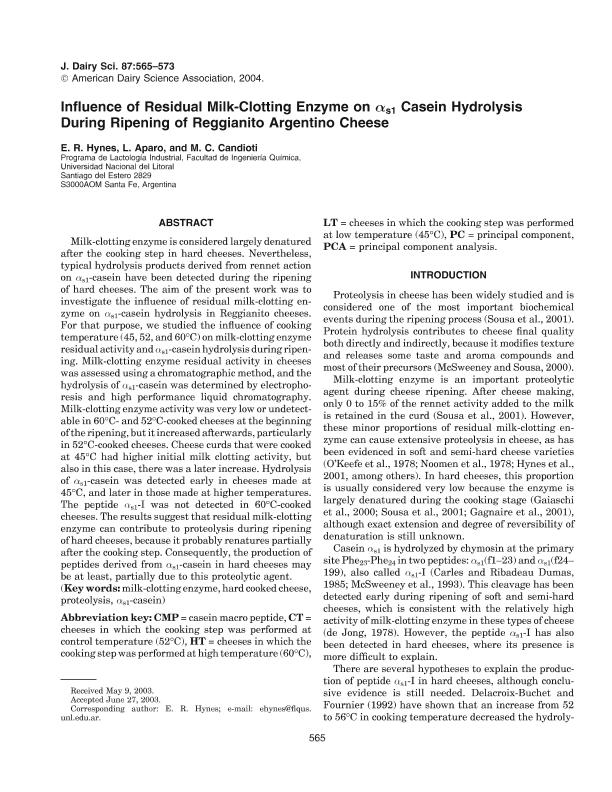Artículo
Influence of residual milk-clotting enzyme on αs1 casein hydrolysis during ripening of Reggianito Argentino cheese
Fecha de publicación:
04/2004
Editorial:
American Dairy Science Association
Revista:
Journal of Dairy Science
ISSN:
0022-0302
Idioma:
Inglés
Tipo de recurso:
Artículo publicado
Clasificación temática:
Resumen
Milk-clotting enzyme is considered largely denatured after the cooking step in hard cheeses. Nevertheless, typical hydrolysis products derived from rennet action on αs1-casein have been detected during the ripening of hard cheeses. The aim of the present work was to investigate the influence of residual milk-clotting enzyme on αs1-casein hydrolysis in Reggianito cheeses. For that purpose, we studied the influence of cooking temperature (45, 52, and 60°C) on milk-clotting enzyme residual activity and αs1-casein hydrolysis during ripening. Milk-clotting enzyme residual activity in cheeses was assessed using a chromatographic method, and the hydrolysis of αs1-casein was determined by electrophoresis and high performance liquid chromatography. Milk-clotting enzyme activity was very low or undetectable in 60°C- and 52°C-cooked cheeses at the beginning of the ripening, but it increased afterwards, particularly in 52°C-cooked cheeses. Cheese curds that were cooked at 45°C had higher initial milk clotting activity, but also in this case, there was a later increase. Hydrolysis of αs1-casein was detected early in cheeses made at 45°C, and later in those made at higher temperatures. The peptide αs1-I was not detected in 60°C-cooked cheeses. The results suggest that residual milk-clotting enzyme can contribute to proteolysis during ripening of hard cheeses, because it probably renatures partially after the cooking step. Consequently, the production of peptides derived from αs1-casein in hard cheeses may be at least, partially due to this proteolytic agent.
Palabras clave:
HARD COOKED CHEESE
,
MILK-CLOTTING ENZYME
,
PROTEOLYSIS
,
ΑS1- CASEIN
Archivos asociados
Licencia
Identificadores
Colecciones
Articulos(INLAIN)
Articulos de INST.DE LACTOLOGIA INDUSTRIAL
Articulos de INST.DE LACTOLOGIA INDUSTRIAL
Citación
Hynes, Erica Rut; Aparo, Luciana; Candioti, Mario César; Influence of residual milk-clotting enzyme on αs1 casein hydrolysis during ripening of Reggianito Argentino cheese; American Dairy Science Association; Journal of Dairy Science; 87; 3; 4-2004; 565-573
Compartir
Altmétricas




